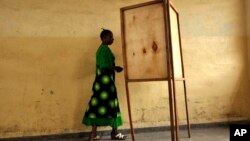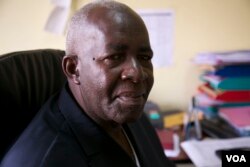Reports of beatings, intimidation and extortion in the tiny southeast African country of Burundi have raised fears of increasing political repression ahead of elections in May. Recently, the violence has calmed, but rights activists, journalists and political opponents of the ruling party claim it has been replaced with electoral fraud.
Burundi's Interior Minister Edouard Nduwimana has dismissed reports by international rights organizations that earlier this year accused the government of detaining and harassing critics. They also charged the ruling party with backing elements within its youth party - called the Imbonerakure - which are accused of mass extortion and widespread violence against civilians.
He says he thinks one should be suspicious of the people who do these reports. Do they actually come in and look at the security situation of the country?
Nduwimana also denies the findings of a leaked U.N. report that accuses certain generals and politicians allied to the government of distributing weapons to youth members - some of whom were allegedly taken to nearby Democratic Republic of Congo for military training.
The violence reportedly stopped a few weeks ago, but veteran rights defender Pierre-Claver Mbonimpa says that's only because of the international outcry. He says the ruling party has changed its tactics and is now rigging votes instead.
He says that's why things are a bit calmer, only because other activities are under way, like going after voters at registration."
Activists say they have seen buses transporting youths from one area to another and being issued several voting cards.
Burundi's 12-year civil war ended in 2005, but it is one of the world's poorest and hungriest countries.
Large numbers of illiterate youths ally themselves to politicians as the surest way to get a slice of the pie in a hugely corrupt country where a booming population and shrinking land are a major source of conflict.
In short, votes can be easily bought.
But Ndayicariye, who presides over what journalists, civil society members and rival political parties say is not an independent electoral commission, says most of this talk is just "political speculation" by untrustworthy people with an agenda.
He says be careful of the excessive vocabulary of politicians and certain civil society reps. He acknowledges that certain citizens, certain militant members of political parties, have more than one ID card, which is not normal.
A coalition of 18 political parties has threatened to boycott elections unless the electoral commission is dissolved and a reliable registration process put in place.
Mbonimpa says if the demands of these political parties are not met, rival youth party members will take to the streets and take on the Imbonerakure.
He says if things continue and the government goes ahead with elections that have these errors and mistakes, the opposition parties won't tolerate it, the youth won't tolerate it, and there definitely will be violence.
Nduwimana, on the other hand, said there is "zero probability" of next year's elections turning bloody. But some international charities are already planning for the worst.





